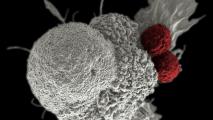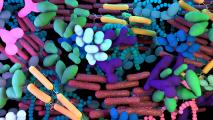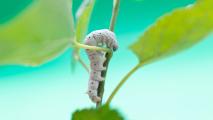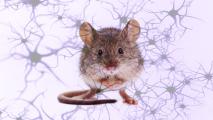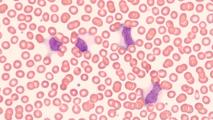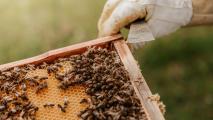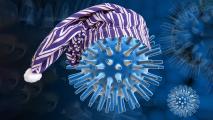
Biotech
Human history has been all but defined by death and disease, plague and pandemic. Advancements in 20th century medicine changed all of that. Now advancements in 21st century medicine promise to go even further. Could we bring about an end to disease? Reverse aging? Give hearing to the deaf and sight to the blind? The answer may be yes. And soon.
More
Nanoparticles are the future of medicine
The success of some drugs that use nanoparticles, such as the COVID-19 mRNA vaccines, has prompted excitement among researchers.
Nanobots are real, and they can battle bacteria
Researchers have developed antibiotic nanobots that can traverse a wound on their own.
Watch: Medic in jet suit reaches mountain top in 3.5 minutes
A paramedic in a jet suit flew up a mountain in just 3.5 minutes, demonstrating how the tech could shave valuable minutes off response times.
Will new vaccines be better at fighting coronavirus variants?
New virus-based vaccines could play an important role in generating a long-lasting, broad immunity against a rapidly mutating virus.
How we treat inflammation may be causing chronic pain
Reversing common belief, researchers at McGill say treating inflammation may be causing chronic pain, not preventing it.
Can your mind ever “own” an extra body part?
A robotic finger can feel like a part of our hand after just a short time using it, suggesting that our brains can “own” extra body parts.
How a healthy sex life can help minimize depression and anxiety symptoms
When you struggle with anxiety or depression, sex may be the last thing on your mind. But it can be a tool for well-being.
New MRI machine will unlock better images for medicine
A new MRI machine with a larger opening and a weaker magnetic field overcomes many shortcomings of other scanners.
Gene editing could reverse anxiety and alcohol-use disorder
Gene editing may be a treatment for anxiety and alcoholism in adults who were exposed to binge-drinking in their adolescence.
From robotic dogs to magnetic slime: 6 ways robots are helping humans
Robots are helping humans in a growing number of places – from archaeological sites to disaster zones to sewers.
Silkworms could one day repair human tendons stronger than before
Mixing silk protein with a gel matrix allowed for better cell growth and healing in rat models.
Nonprofit drugmaker Civica Rx is taking aim at the high insulin price
People living with insulin-dependent diabetes have been waiting a long time for it to be more affordable. Could things change?
Watch John McEnroe take on past versions of himself on the court
Thanks to AI, digital avatars, and robotic cannons, John McEnroe is taking on his toughest opponent: himself.
Brain infusions from younger mice revive memory in older ones
Stanford researchers have found that an infusion of cerebrospinal fluid from young mice improves the memory of old ones.
The NBA’s Golden State Warriors use data to optimize the fan experience
The Warriors are using data in an attempt to deliver the best — and best targeted — fan experience possible.
New vaccine for Epstein-Barr virus enters human trials
A Epstein-Barr virus (EBV) vaccine entering human trials could potentially protect against everything from mono to multiple sclerosis.
‘Mad honey’: The rare hallucinogen from the mountains of Nepal
On the mountainsides of Nepal and Turkey, bees sometimes produce a strange and dangerous concoction: mad honey.
Neuralink rival will soon test brain implant in US clinical trials
It’s the first time the FDA has approved clinical trials for a brain-computer interface.
How herpes wakes up
Researchers believe they have identified how herpes hiding in your cells wakes back up to cause symptoms.
Genes from over 5,000 stroke patients hint at surprising treatment
A study of nearly 6,000 stroke patient genomes suggests a treatment idea abandoned for decades should get a second look.
Get inspired with the most innovative stories shaping the world around us.













